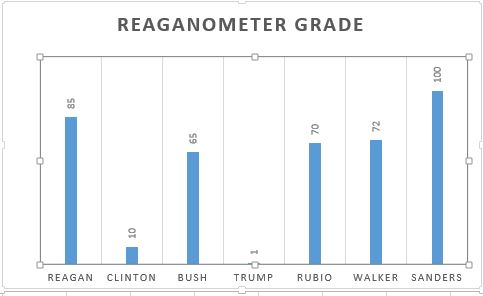Let’s return to The Reaganometer and see how Bernie Sanders does. This comparison evaluates a candidate’s presidential announcement speech against that of Ronald Reagan in 1980. I chose Reagan because his speech treated us as citizens, able to follow his arguments as thinking adults. He set forth his diagnosis of the ills facing America, and like it or not, voters had specifics about where Reagan would lead the country.
Scroll through Sanders’ announcement speech and you’ll find that it has a preamble, recognition of the problems Sanders thinks America is facing, and his agenda for addressing those challenges. There are actual paragraphs. After reading the announcements of Donald Trump, Marco Rubio, Scott Walker, and watching Hillary Clinton’s announcement video, the promise of a coherent schematic of ideas was cause for optimism.
After the introduction Sanders quickly shifted gears into his diagnosis of the ills facing the country. His first problem: income and wealth inequality. He described the gap between the richest Americans and the rest of us as “the great moral issue of our time, it is the great economic issue of our time and it is the great political issue of our time.” He promised as to fix America’s “rigged economy.” Sanders recognized the disappearing middle class, continuing real high unemployment, and poverty. He pledged to make our economy work for those Americans.
Sanders blistered the Citizens United decision and described wealthy individuals trying to buy elections, directly undermining the promise of government by the people. “This is not democracy. This is oligarchy.” So much for Reaganite optimism, but how can you dispute Sanders’ argument? It is not morning in America.
Ad-speak has become our accustomed means of political communications: complex problems simplified, easy solutions offered. Happy b-roll. That wasn’t Reagan. When he discussed energy, he laid out in detail how he intended to address America’s needs. Sanders was similar when he took on climate change. He discussed the problem and the scientific consensus about the human causes of climate change. He tied our inertia to our cynicism about getting anything done, bred by the money of old energy giants like the Koch brothers. You didn’t read Reagan and come away wondering what he thought about energy. You don’t read Sanders and leave confused about his approach to climate change.
Sanders spoke of “jobs, jobs, jobs” – provided in large part by public works projects. He promised federal action on raising the minimum wage. “Our goal as a nation must be to ensure that no full-time worker lives in poverty. Further, we must establish pay equity for women workers.” This is radical?
Campaign finance reform, climate change, health care, care for the poor, war and peace, national security. Sanders covered these topics and his plans for dealing with them. Agree with him or not you know where he’s going. He treated his audience as adults.
Reagan’s speech was a paradigm of a time when statesmen faced expectations of addressing the people as citizens who could face their problems, understand them and choose a path forward. Sanders speech does all of that. Why? I think it is because the very premise of his campaign rejects the ethos of poll-tested corporate marketing that suffuses the template of the modern professional campaign announcement.
Sorry Reaganites, Sanders outscores Reagan on the Reaganometer (I had penalized Reagan for distorting the meaning of “a city upon a hill”). Read Sanders’ speech, hate the speech, love the speech, but bask in the speech. It’s rare - it treats you, the citizen, with the dignity you deserve.


